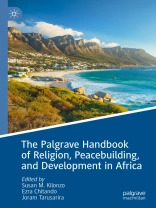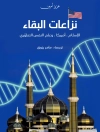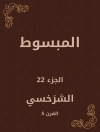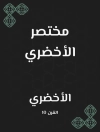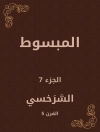This Handbook explores the ways in which religion among the African people has been applied in situations of conflict and violence to contribute to sustainable peace and development. It analyzes how peacebuilding inspired and enabled by religion serves as the foundation for sustainable development in Africa, while also acknowledging that religion can also be a tool of destruction, and can be used to fuel violence and underdevelopment. Contributors to this volume offer theoretical discussions from existing literature, as well as experiences of practitioners, to deepen the readers’ understanding on the role of religion and religious institutions in peacebuilding and development in Africa. The Handbook provides reflections on possible future developments as well, thereby aligning with the goals of SDG 16.
विषयसूची
1. Religion, Peacebuilding and Development in Africa: An Introduction.- Part I Contextualising Religion, Peacebuilding and Development in Africa.- 2. Religion, Peacebuilding, and Development in Africa: A Critical Appreciation.- 3. Religion and Peacebuilding in African Religious Studies and Theology: An Overview and Preliminary Evaluation.- 4. Religion, Peacebuilding and Development in Africa: Challenges.- 5. The Bible, Peace Building and Sustainable Development in Africa.- 6. Teaching About Religion, Peacebuilding and Development in Africa.- 7. Intersectionalities: Whiteness, Religion, Peacebuilding and Development in Africa.- 8. Climate Security and Religion in Africa: Towards Sustainable Development Goals.- Part II Country Case Studies on Religion, Peacebuilding and Development in Africa.- 9. Religion, Conflict and Peacebuilding in Rwanda.- 10. Building Resilience and Everyday Peace at the Micro-Levels in South Sudan.- 11. Developing Transformatively: Religion and Peace Mediation in Nigeria.- 12. Ethnic and Political Conflicts Resolution in Burundi: The Contribution of Religious Organisations.- 13. Reclaiming Everyday Peace in the Micro-Spaces in Burundi.- 14. Religion and Peacebuilding in Tanzania: Institutionalisation of Interfaith Peace Committee.- 15. Religion and Peacebuilding in the Democratic Republic of the Congo (DRC).- 16. Religion, Peacebuilding, and Development in Uganda.- 17. Indigenous Spirituality, Peacebuilding, and Development in Eswatini.- Part III Diverse Religions in Africa, Peacebuilding and Development.- 18. The Role of Traditional Authorities in the Promotion of Electoral Justice and Peacebuilding in Ghana.- 19. Rastafari Insights into Peace-building and Sustainable Development.- 20. Islamophobic Agenda: An Analysis of Media Representation of Radicalization and Terrorism in Kenya Since 2000.- 21. Islam, Conflict, Peace and Security in Africa.- 22. Apostolic Churches and Youth Response to Social Challenges Post-Violence in Zimbabwe.- Part IV Actors in Religion, Peacebuilding and Development.- 23. African Traditions in the Study of Religion, Peacebuilding and Development in Africa: Engaging with Emmanuel Katongole.- 24. Traditional Leaders and the Quest for Sustainable Peace in Kenya.- 25. Decolonising Peacebuilding for Development in South Africa: African Traditional Spiritual Leaders as Critical Assets.- 26. Religious Peacebuilding’s Response to Violent Extremism in Informal Settlements in Egypt.- 27. Peace, Justice, and Strong Institutions: The Role of Church Leaders During Political Electioneering Periods in Kenya.- 28. Religion, Conflict Transformation, Peacebuilding, and Development in Ghana: The Role of the National Peace Council.- 29. The All Africa Conference of Churches (AACC): Youth, Peacebuilding, and Development in Africa.- Part V Interfaith Networks, Peacebuilding and Development in Africa.- 30. Interfaith Networks, Peacebuilding and Development in Africa: Analysis of the Contribution of the Fellowship of Christian Councils and Churches to Peacebuilding.- 31. Interfaith Dialogue, Peacebuilding, and Sustainable Development in Nigeria: A Case of the Nigeria Inter-Religious Council (NIREC).- 32. Xenophobia, Interfaith Networks, Peace Building and Development in Botswana.- 33. Role of Islamic Networks in Peacebuilding and Development in Kenya, and the War on Terror.- 34. Re-building Muslim-Christian Relations and Everyday Peace in West Nile, Uganda.- 35. Gender, Religion, Peacebuilding, and Development in Zimbabwe.- 36. Religion, Feminist Peace, and Security in Nigeria and Uganda.- 37. Gender, Religion, Peacebuilding, and Development in Zambia: Doreen Mazuba Malambo’s Trajectory in Peacekeeping Missions.- 38. Disability and Migration: Religious and Traditional Disability Beliefs as Causes of Migration of Zimbabwean Mothers of Children with Disabilities to South Africa.- 39. Gender, SDG 16, Peacebuilding and Development in Kenya.- 40. The Role of Women Church Leaders in Peacebuilding and Social Economic Transformation in Post-Conflict Uganda.- Part VII Topical Issues in Religion, Peacebuilding and Development in Africa.- 41. Ubuntu, Peacebuilding, and Development in Africa: Reflections on the Promises and Challenges of a Popular Concept.- 42. Shaping the Instruments of Peace: Religion in Digital Peacebuilding in Africa.- 43. Religion and Agriculture for Peacebuilding in Rwanda: Analysing the Role of Christian Faith-Based Organisations in the Post-genocide Agrarian Change.- 44. Arts, Religion, Peacebuilding and Development in Post-conflict Northern Uganda.- Part VIII Conclusion.- 45. Imagining the Future of Religion, Peacebuilding and Development in Africa.
लेखक के बारे में
Susan M. Kilonzo is an Associate Professor of Sociology of Religion at Maseno University, Kenya.
Ezra Chitando is a Professor of History of Religions at the University of Zimbabwe, and Theology Consultant on HIV for the World Council of Churches.
Joram Tarusarira is an Assistant Professor of Religion, Conflict, and Peacebuilding at the University of Groningen, the Netherlands.
